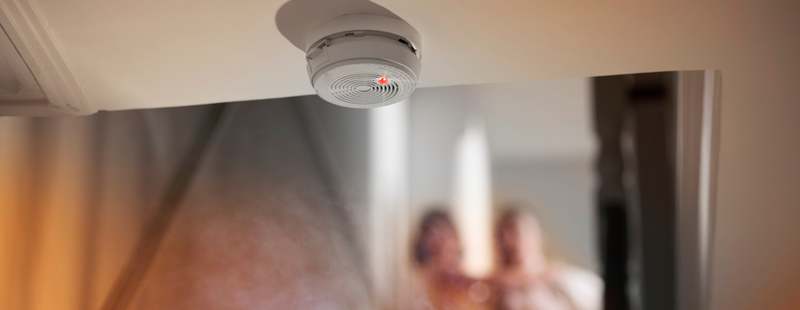
These are two different animals, and its important for anyone involved with life safety systems or their
design, installation, service or testing to know the differences. Its not uncommon for some to call a smoke alarm a detector, and hopefully you will not be one of them after reading what follows.
A smoke alarm and a smoke detector both detect smoke. They are usually both round and they are all usually white, but don’t have to be. The similarities end there, as there is a difference between a smoke alarm and a smoke detector.
What Is A Smoke Alarm?
A smoke alarm is a smoke detection and an alarm device that is powered by 120VAC, your regular household electrical wiring. It may have a battery backup so that it will operate during commercial electrical power failures. It is what might be called a stand-alone unit because it has an audible device built in which sounds when the unit detects a programmed level of smoke. Some even have strobe lights to be used where those with impaired hearing might be present.
Some models can even be interconnected together so that when one senses smoke, all the smoke alarms in a building that are interconnected with the smoke in alarm will sound an alarm. Usually, the detector that sensed the smoke will have some visual indication that it was the one that sensed the smoke.
There are even smoke alarms that are combination smoke and carbon monoxide(CO) alarms, and they will sound a different signal depending upon whether it was smoke or carbon monoxide that set it off.
Some smoke alarms are battery operated only with no connection to any electrical power. These have limited use, cannot be interconnected and are usually found in small single family homes or cottages where wiring would be difficult and/or too expensive to install.
What Batteries Do Smoke Alarms Use?
Some units have batteries that will last 10 years which is the expected life span of a smoke alarm itself and should then be replaced. Others have the standard, boxy, 9 volt batteries, and they should be replaced periodically per the manufacturer’s instructions that come with the units.
How Often Should You Test Your Smoke Alarm?
Additionally, these smoke alarms must be tested regularly, ideally once a month using a test switch on the unit.
How Is A Smoke Detector Different From A Smoke Alarm?
Smoke detectors are not stand-alone units and require a fire alarm control unit (FACU) to which it’s connected. They are sometimes referred to as system detectors, and the FACU provides it with power and will respond when the smoke detector senses a preset level of smoke.
The response can consist of many events, but primarily the FACU will activate some notification appliance circuits with bells, horns, or speakers and visual appliances as well, to indicate to occupants to evacuate or relocate within the building.
There are models of smoke detectors that incorporate a carbon monoxide detection device which will indicate to the FACU when in alarm that it was caused by smoke or by CO. The FACU can then do different things with each of those signals. The wiring between the FACU and the smoke detector is supervised by the FACU for wiring conditions that might disable the detector from operating.
What Kind Of Batteries Do Smoke Detectors Take?
There is no need for the battery in the detector as in smoke alarm as the FACU provides the battery back-up with one set of system batteries. This is a huge labor advantage to the owner of a large residential occupancy because the batteries in the FACU will be replaced every four years or so, not every year as in a smoke alarm. (We’ll talk about that in another blog)
So you see, there is a big difference between a smoke alarm and a smoke detector.
Stay tuned for more exciting blogs about fire alarm and life safety systems.


